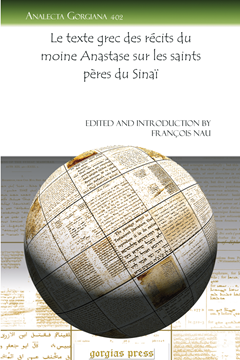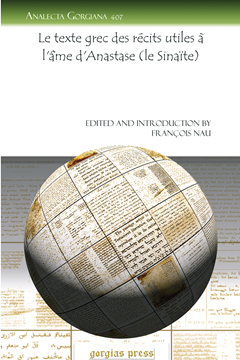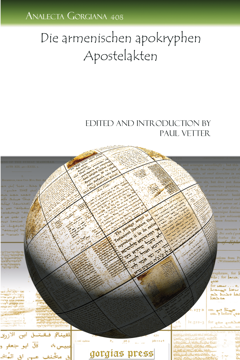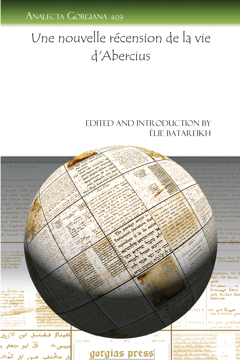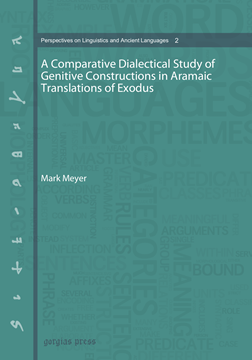Un recueil de sentences attribué à Isaac le Syrien
Edited with an Introduction by Marius Besson
Series: Analecta Gorgiana 401
ISBN: 978-1-60724-675-6
Marius Besson presents the critical text of two manuscripts containing an apophthegmatic text with sayings attributed to Isaac of Nineveh. The text also includes a separate apparatus with references to parallel texts in various early Christian documents.
$35.00 (USD)
Le texte grec des récits du moine Anastase sur les saints pères du Sinaï
Edited with an Introduction by François Nau
Series: Analecta Gorgiana 402
ISBN: 978-1-60724-676-3
François Nau collated various manuscripts containing stories about the holy fathers of Sinai and presents here the critical and annotated text. These stories offer otherwise unknown information about St. John Climacus and include useful historical and geographic details.
$37.00 (USD)
Eine syrische "Liturgie S. Athanasii"
Edited with an Introduction by Anton Baumstark
Series: Analecta Gorgiana 403
ISBN: 978-1-60724-677-0
This Syriac version of the “Liturgy of St. Athanasius” provides a valuable resource for the development of liturgical materials and practices in the Syrian Monophysite tradition. The text includes a critical apparatus and a Latin translation.
$39.00 (USD)
Zwei Synoden des Katholikos Timotheos I
Edited with an Introduction by Oskar Braun
Series: Analecta Gorgiana 404
ISBN: 978-1-60724-678-7
The records of two provincial synods found among the writings of Catholicos Timothy I provide a unique perspective into the christological disputes and struggle for authority in Syriac-speaking Christianity in the late 8th century.
$36.00 (USD)
Abû-l-Barakats nichtgriechisches Verzeichnis der 70 Jünger
Edited with an Introduction by Anton Baumstark
Series: Analecta Gorgiana 405
ISBN: 978-1-60724-680-0
Abu-al-Barakat published two versions of the list of seventy disciples sent out by Jesus. Anton Baumstark presents here the Arabic text, along with a Latin translation, of Barakat’s list that was allegedly translated a non-Greek source.
$38.00 (USD)
Abû-l-Barakats "griechisches" Verzeichnis der 70 Jünger
Edited with an Introduction by Anton Baumstark
Series: Analecta Gorgiana 406
ISBN: 978-1-60724-681-7
Abu-al-Barakat published two versions of the list of seventy disciples sent out by Jesus. Anton Baumstark presents here the Arabic text, along with a critical Latin version, of Barakat’s list that was allegedly translated from a Greek original.
$37.00 (USD)
Le texte grec des récits utiles à l'âme d'Anastase (le Sinaïte)
Edited with an Introduction by François Nau
Series: Analecta Gorgiana 407
ISBN: 978-1-60724-682-4
These eighteen stories pertaining to Anastasius of Mount Sinai include unique information and variations of stories preserved elsewhere. Nau presents the edited Greek text along with an introductory discussion of authorship and sources.
$38.00 (USD)
Die armenischen apokryphen Apostelakten II. Die Akten der Apostel Petrus und Paulus
Edited with an Introduction by Paul Vetter
Series: Analecta Gorgiana 408
ISBN: 978-1-60724-683-1
Paul Vetter presents here a critical edition of the Armenian version of the Acts of Peter and Paul along with a Greek translation. Vetter’s introduction to the text includes a discussion of the complex transmission history evident in the manuscripts.
$53.00 (USD)
Une nouvelle récension de la vie d'Abercius
Edited with an Introduction by Élie Batareikh
Series: Analecta Gorgiana 409
ISBN: 978-1-60724-684-8
The Life of Abercius, which received much attention after the archaeological discovery of the “inscription of Abercius,” previously existed in two recensions. Élie Batareikh found a manuscript containing a third recension and publishes here the Greek text of that recension.
$37.00 (USD)
A Comparative Dialectical Study of Genitive Constructions in Aramaic Translations of Exodus
By Mark Meyer
ISBN: 978-1-61143-002-8
This book uses the multiple Aramaic translations of Exodus to reveal important similarities and differences between five Aramaic dialects in the use of genitive constructions: the Syriac Peshitta, Targum Onkelos, three corpora of the Palestinian Targum, the Samaritan Targum, and fragments of a Christian Palestinian Aramaic translation of Exodus.
$219.00 (USD)

